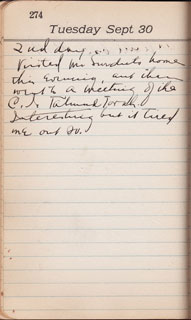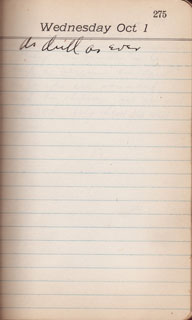
2nd day
Visited Mr. Surduts home
this evening, and then
went to a meeting of the
C.I. Talmud Torah
Interesting but it tired
me out so.
—————–
Matt’s Notes
“2nd day” refers to the second day of Rosh Hashanah, a.k.a. the Jewish New Year, one of several major milestones clustered on the Jewish calendar in early fall. As I’ve noted over the past few days, Papa would have taken this holiday’s focus on repentance, renewal and self-evaluation quite seriously, and today he demonstrates his religious state of mind by riding all the way out to Sea Breeze Avenue in Coney Island for Torah study.1 (I expect he developed his connection to the Coney Island Talmud Torah during the summer, when he would frequently visit Coney Island with friends but take leave in the evenings to say Kaddish for his father in the Coney Island Synagogue.)
As we’ve also noted, these were the first High Holy Days Papa would observe since his father died back in May. His diary entries over the past few weeks have been either non-existent or cursory, indicating, I think, how emotionally overwhelmed he now feels, all his homesickness and unhappiness amplified, mixed together, adding up to a feeling too exhausting to put in words. Remember, too, that Papa’s father was a Talmud Torah teacher himself, so Papa’s presence in a Talmud Torah would have brought forth an additional torrent of memories and emotions, probably surprising in their intensity and timing. (I can’t help but allow my personal experience to fuel this speculation; even eleven years after my own father’s death I find myself ambushed by, flooded with, unexpected feelings at inopportune times). No wonder his trip to Coney Island tired him out.
—————–
This entry contains the name of a person whose home Papa visited, but I can’t quite read it. It looks like “Mr Surdut,” but that doesn’t seem right. Any thoughts?

——————-
References:
1 – The 1919-1920 American Jewish Yearbook lists a Coney Island Talmud Torah on Sea Breeze Avenue. Subsequent editions of the Yearbook, including those covering 1924, cut their listings of local educational organizations way down, so I haven’t yet confirmed that the Coney Island Talmud Torah still existed at that location in 1924. Still, it seems like safe bet. The Ocean Parkway stop on the Brighton Beach BMT line (which seems to have evolved into today’s Q) was just a couple of blocks away.



 Philip my brother in law
Philip my brother in law
 3rd dist & Cafe Royal
3rd dist & Cafe Royal Am so worried, Philip is
Am so worried, Philip is